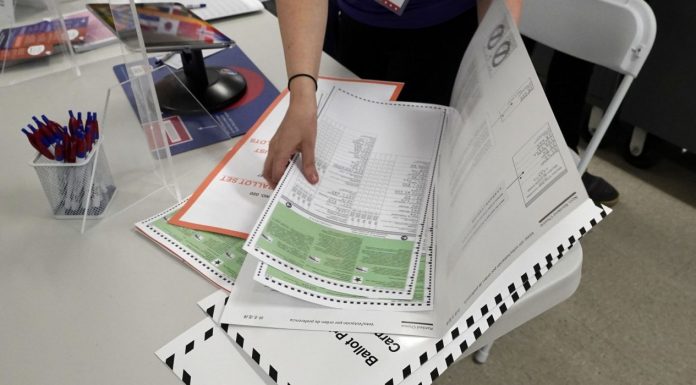(Headline USA) With Democrats’ controversial HR1 election overhaul on the cusp of failure in the evenly divided Senate Tuesday, New York City prepared for another case study in why lax and loosely regulated voting policies erode faith in the democratic system.
The race to succeed Mayor Bill de Blasio holds with it the fate of one of the world’s most illustrious and culturally influential cities.
For many, the top issue of rising crime rates—the direct result of de Blasio’s unabashedly anti-police policies—could determine whether the Big Apple retains its status or whether it continues to witness the mass-exodus of residents to more conservative regions like Florida.
Among the “woke” Left, the election also has serious stakes for advancing the cause of identity politics. They trumpet the fact that the city could get its first female mayor, its first Asian–American mayor or its second Black mayor, depending on who comes out on top.
But with the debut of the ranked voting system and a mountain of absentee ballots still at least a week away from being counted, it could be July before a winner emerges in the Democratic contest.
Given the recent focus on widespread and systemic vote fraud in urban centers throughout the country, this combination of variables could spell trouble for the city whose de facto Democratic headquarters, Tammany Hall, was long synonymous with political corruption.
In addition to the possibility of ballot-stuffing and other fraud factors, voter turnout may be a major factor. A ranked voting system means that if the leading candidate fails to reach a certain threshold, that person might not ultimately make the cut.
For example, if a moderate candidate were to secure 49% of the overall vote, but radical left-wing candidates finished with higher ranked averages, it would ultimately fall to the ranking system to determine the winner.
The potential for mathematical errors alone is a threat of King Kong-size proportions.
According to recent polling, four Democrat candidates are locked into a tight, single-digit race that could lead to more than a dozen rounds of re-allocations of votes.
Brooklyn Borough President Eric Adams, a former police captain who co-founded a leadership group for black officers, has led in several recent polls.
But he’s been closely trailed by former city sanitation commissioner Kathryn Garcia and former de Blasio administration lawyer Maya Wiley, with former presidential candidate Andrew Yang also in pursuit.
After polls close at 9 p.m., New York City’s Board of Elections plans to release partial results of votes cast in person, but that initial picture could be misleading because it will only include data on who candidates ranked as their first choice.
The ranked choice system, approved for use in New York City primaries and special elections by referendum in 2019, lets voters rank up to five candidates on their ballot.
Vote tabulation is then done in computerized rounds, with the person in last place getting eliminated each round, and ballots cast for that person getting redistributed to the surviving candidates based on voter rankings. That process continues until only two candidates are left. The one with the most votes wins.
It won’t be until June 29 that the Board of Elections performs a tally of those votes using the new system. It won’t include any absentee ballots in its analysis until July 6, making any count before then potentially unreliable.
More than 87,000 absentee ballots had been received by the city as of Monday, with more expected to arrive in the mail over the next few days.
Besides Adams, Garcia, Wiley and Yang, other contenders in the Democratic contest include City Comptroller Scott Stringer, former U.S. Secretary of Housing and Urban Development Shaun Donovan, former Citigroup executive Ray McGuire and nonprofit executive Dianne Morales.
De Blasio, a Democrat, leaves office at the end of the year due to term limits.
In the Republican primary, Guardian Angels founder Curtis Sliwa faced off against businessman Fernando Mateo. Because there are only two candidates in that race, ranked choice voting won’t be a factor.
Concern over a rise in shootings and other violent crime has dominated the mayoral campaign in recent months. As a former officer—but one who spent his career fighting racism within the department—Adams may have benefited most from the policing debate.
He denounced the “defund the police” slogan and proposed reinstating a disbanded plainclothes unit to focus on getting illegal guns off the streets.
Wiley and Stringer, battling for progressive votes, both said they would reallocate a portion of the police department’s budget to other city programs.
Yang and Garcia formed an alliance in the campaign’s last days in an apparent effort to use the ranked voting system to block Adams.
“If you support me, please make sure to also support Kathryn Garcia on your ballot,” Yang said at one of several joint campaign events last weekend. “She’s an outstanding public servant.”
Adams accused his two rivals of “saying we can’t trust a person of color to be the mayor of the city of New York.”
Neither Sliwa nor Mateo has much of a chance to win the November general election in a city where registered Democrats outnumber Republicans by 7 to 1.
Former allies, the two Republicans traded personal insults and tried to shout over each other during one debate on Zoom.
Sliwa, a radio host who still wears his red Guardian Angels beret when he appears in public, got an endorsement from former Mayor Rudy Giuliani, who called him “my great friend” in a robocall to Republican voters.
Mateo, a restaurateur who has led organizations advocating for car service drivers and bodega owners, was endorsed by Michael Flynn, former president Donald Trump’s first national security adviser.
Adapted from reporting by the Associated Press

